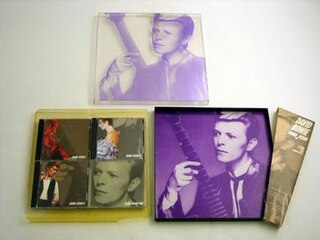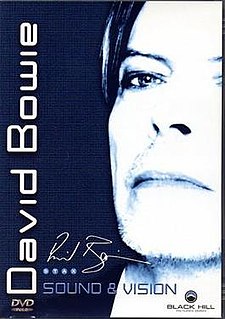
"Under Pressure" is a song by the British rock band Queen and singer David Bowie. Originally released as a single in October 1981, it was later included on Queen's 1982 album Hot Space. The song reached number one on the UK Singles Chart, becoming Queen's second number-one hit in their home country and Bowie's third. The song charted in the top 10 in more than ten countries around the world, and peaked at No. 29 on the US Billboard Hot 100 in January 1982.

Aladdin Sane is the sixth studio album by English musician David Bowie, released by RCA Records on 13 April 1973. The follow-up to his breakthrough The Rise and Fall of Ziggy Stardust and the Spiders from Mars, it was the first album he wrote and released from a position of stardom.

"Suffragette City" is a song by David Bowie. It featured on The Rise and Fall of Ziggy Stardust and the Spiders from Mars album in 1972, and was previously released as the B-side to the Starman single in April 1972. It was later issued as a single in 1976 to promote the Changesonebowie compilation in the UK, with the US single edit of "Stay" on the B-side. The single failed to chart.
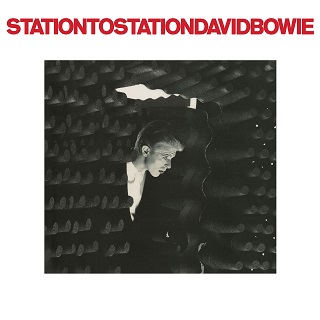
Station to Station is the 10th studio album by English musician David Bowie, released by RCA Records in 1976. Commonly regarded as one of his most significant works, Station to Station was the vehicle for his performance persona, the Thin White Duke. The album was recorded after he completed shooting Nicolas Roeg's The Man Who Fell to Earth, and the cover artwork featured a still from the movie. During the sessions, Bowie was heavily dependent on drugs, especially cocaine, and later claimed that he recalled almost nothing of the production.

"Rebel Rebel" is a song by David Bowie, released in 1974 as a single from the album Diamond Dogs. Cited as his most covered track, it has been described as being effectively Bowie's farewell to the glam rock movement that he had helped pioneer, as well as being a proto-punk track.

"Fame" is a song recorded by David Bowie, initially released in 1975. Written by Bowie, Carlos Alomar and John Lennon, it was a hit in North America, becoming Bowie's first number 1 single in the Canadian Singles Chart as well as the U.S. Billboard Hot 100. The song was one of the more successful singles of the year, ranking at number 7 on the Billboard Year-End Hot 100. It was less successful in Europe, reaching number 17 in the UK Singles Chart.

"Changes" is a song by David Bowie, originally released on the album Hunky Dory in December 1971 and as a single on 7 January 1972, the day before Bowie's 25th birthday. Despite missing the top 40 of the Billboard Hot 100, "Changes" became one of Bowie's best-known songs. The lyrics are often seen as a manifesto for his chameleonic personality, the frequent change of the world today, and frequent reinventions of his musical style throughout the 1970s. This single has been cited as David Bowie's official North American debut, despite the fact that the song "The Man Who Sold the World" was released in North America two years prior. Changes was the last song Bowie performed live on stage before his retirement from live performances at the end of 2006.
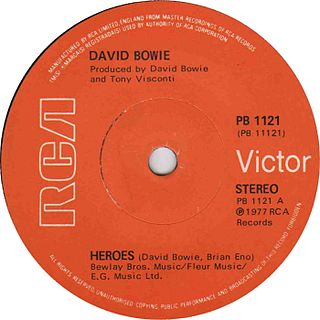
"'Heroes'" is a song by English musician David Bowie. It was co-written by Bowie and Brian Eno, produced by Bowie and Tony Visconti, and recorded in July and August 1977 at Hansa Studio by the Wall. It was released on 23 September 1977 as the lead single from his 12th studio album of the same name, backed with the song "V-2 Schneider". A product of Bowie's "Berlin" period, the track was not a huge hit in the United Kingdom or United States after its release, but it has since become one of his signature songs. In January 2016, following Bowie's death, the song reached a new peak of number 12 in the UK Singles Chart. "'Heroes'" has been cited as Bowie's second-most covered song after "Rebel Rebel".
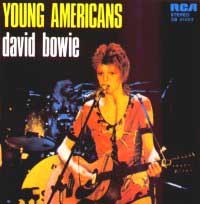
"Young Americans" is a single by English singer and songwriter David Bowie, released in 1975. It is included in the album of the same name. The song was a breakthrough in the United States, where the glam rock of Bowie's earlier career had limited popularity outside the major cities. The song reached No. 28 on the Billboard Hot 100, making it his second biggest success on that chart until that point.

"Drive-In Saturday" is a song by David Bowie from his 1973 album Aladdin Sane. It was released as a single a week before the album and, like its predecessor "The Jean Genie", became a Top 3 UK hit.

"Rock 'n' Roll Suicide" is a song by David Bowie, originally released as the closing track on the album The Rise and Fall of Ziggy Stardust and the Spiders from Mars on 16 June 1972. It detailed Ziggy's final collapse as an old, washed-up rock star and, as such, was also the closing number of the Ziggy Stardust live show. In April 1974 RCA issued it as a single.
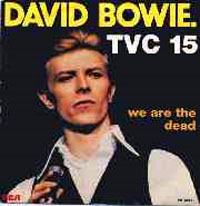
"TVC 15" is a song written and recorded by David Bowie in 1975 and released in 1976.
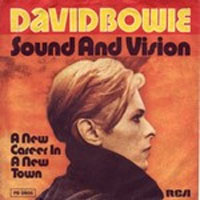
"Sound and Vision" is a song and single by David Bowie which appeared on his 1977 album Low. The song is notable for juxtaposing an uplifting guitar and synthesizer-led instrumental track with Bowie’s withdrawn lyrics. In keeping with the minimalist approach of Low, Bowie and co-producer Tony Visconti originally recorded the track as an instrumental, bar the backing vocal. Bowie then recorded his vocal after the rest of the band had left the studio, before trimming verses off the lyrics and leaving a relatively lengthy instrumental intro on the finished song.

"Breaking Glass" is a song by the English singer/songwriter David Bowie. It was co-written by Bowie, bassist George Murray and drummer Dennis Davis in September 1976. Originally a track on Bowie's 1977 album Low, a reworked version of the song was a regular on the Isolar II Tour. A live version from that tour was used as the lead track on a 7" EP to promote his second live album, Stage in 1978. The EP reached number 54 on the UK Singles Chart in December 1978.
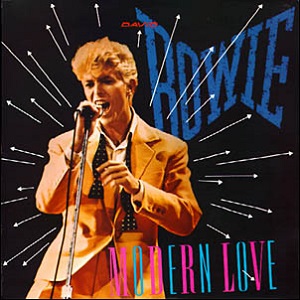
"Modern Love" is a song written and recorded by English singer-songwriter David Bowie. It is the opening track to his album Let's Dance, and was issued as the third single from the album in late 1983.
"Panic in Detroit" is a song written by English singer David Bowie for the album Aladdin Sane in 1973. Bowie based it on friend Iggy Pop's descriptions of revolutionaries he had known in Michigan and Pop's experiences during the 1967 Detroit riots. Rolling Stone magazine called the track "a paranoid descendant of the Motor City's earlier masterpiece, Martha and the Vandellas' "Nowhere to Run"".
"Cracked Actor" is a song written by David Bowie, originally released on the album Aladdin Sane in April 1973. The track was also issued as a single in Eastern Europe by RCA Records in June that year.

"Ashes to Ashes" is a song written and recorded by David Bowie. It was the lead single from the 1980 album Scary Monsters and became Bowie's second UK No. 1 single. It is also known for its innovative video, directed by Bowie and David Mallet, which at the time was the most expensive music video ever made.
